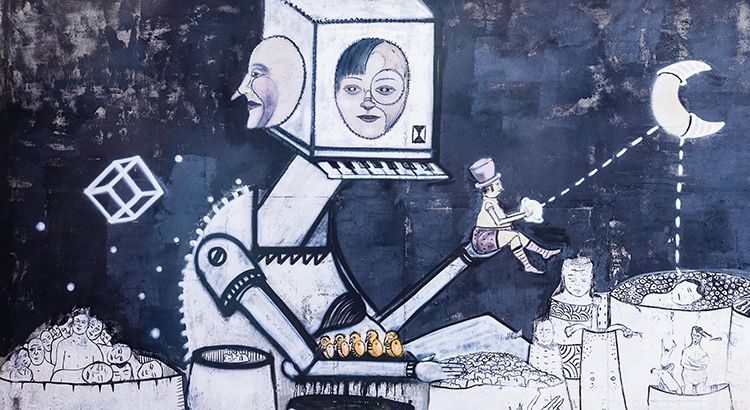Author: Linda Schlegel
Linda Schlegel ist wissenschaftliche Mitarbeiterin am PRIF und Research Fellow bei modus Zentrum für angewandte Deradikalisierungsforschung. Sie forscht zu Gaming und Extremismus(-prävention), Radikalisierungsprozessen im digitalen Raum und Narrativkampagnen gegen Extremismus. // Linda Schlegel is a Research Fellow at PRIF and modus Centre for Applied Research on Deradicalisation. Her research focuses on gaming and (counter-) extremism, online radicalization, and narrative campaigns against extremism. | Twitter: @LiSchlegel
Digitale Gaming-Räume und insbesondere Gaming- und Gaming-nahe Plattformen werden inzwischen nicht nur für Diskussionen über Videospiele genutzt. Da sich auf diesen Plattformen Millionen von Nutzer*innen tummeln, die diesen Diskursen ausgesetzt sind, sind digitale Gaming-Räume immer wichtiger für gesellschaftliche Diskurs- und individuelle Meinungsbildungsprozesse. Dabei zeigt sich eine Überrepräsentation populistischer und rechtsradikaler Inhalte. Unter Umständen beeinflussen diese sogar reale politische Entscheidungen – denn auch aktuelle (welt-)politische Themen und politische Ereignisse wie die Bundestagswahl werden dort verhandelt.
Pixel, Politik, Polemik – Digitale Gaming-Welten als politische und gesellschaftliche Diskursräume
Videospiele sind ein wachsender Wirtschaftszweig und eine beliebte Freizeitbeschäftigung. Gaming- und gaming-nahe digitale Plattformen werden zudem immer mehr zu politischen Diskursräumen, in denen sich Millionen von Menschen zu aktuellen Ereignissen austauschen Sie sind Bestandteil moderner Wahlkämpfe und werden für politische Bildungsarbeit genutzt. Wichtige gesellschaftliche Debatten werden hier abgebildet, und beeinflusst. Deshalb ist es unabdingbar, digitale Gaming-Welten als neue gesellschaftliche Diskursräume zu begreifen, ihren Einfluss ernst zu nehmen und sie in politische Kommunikationsstrategien einzubeziehen. Dies gilt insbesondere deshalb, weil anti-demokratische Akteure momentan Teile dieser Gaming-Räume zu beeinflussen versuchen und demokratische Gegenrede unzureichend praktiziert wird.
As You Like It: User Types in Digital Gamified Radicalization Processes
Since the Christchurch attack in 2019, it is explored how games, gaming spaces, gamification, and violent extremism are potentially linked and how gaming-related content may influence digital radicalization processes. However, both the theoretical and empirical basis to understand this influence are underdeveloped. This blog post adds to the theoretical foundation of a “gamification of radicalization” by presenting five ideal user types and their potential interaction with gamified extremist content.
Telling tales against the dark arts: How fictional storytelling could support narrative campaigns against extremism
While Harry Potter and his friends could use their magic abilities to defend the world against the dark arts, efforts against radicalization and extremism in the real world must rely on non-magic skills, most prominently (strategic) communications. Narrative campaigns challenging extremist ideas and propagating positive, alternative visions are an increasingly important tool in the efforts to prevent and counter radicalization. So far, however, such campaigns have largely omitted fictional elements, despite ample evidence that fictitious stories hold considerable persuasive power and have inherent benefits that could support narrative efforts against extremism.
Let’s play prevention: Can P/CVE turn the tables on extremists’ use of gamification?
In the wake of the attacks in Christchurch, El Paso and Halle, the so-called ‘gamification of terror’ has made headlines and sparked academic interest in the potential role of gamification in radicalisation processes. Most recently, the Radicalization Awareness Network (RAN) has discussed both videogames and gamification as potential facilitating factors of radicalisation in the EU. This blog article is based on the new RAN Paper “The Gamification of Violent Extremism & Lessons for P/CVE”.
Missing an epic story: Why we are struggling to counter extremists’ utopian narratives
Contrary to popular opinion, extremist communication is not simply based on hatred and calls for violence. While beheading videos or livestreamed shootings may generate attention, displays of violence alone are an insufficient basis for an extremist ideology and claims of legitimacy. Utopian narratives – visions for the perfect society – are an indispensable element of propaganda efforts. Without detailing what one is fighting for, an essential part would be missing from the web of extremist ideological communication. While the last years have seen an increase in narrative campaigns designed to delegitimize extremist ideologies and provide alternative worldviews, pro-democracy narratives struggle with responding to the utopian visions propagated by extremist actors.





